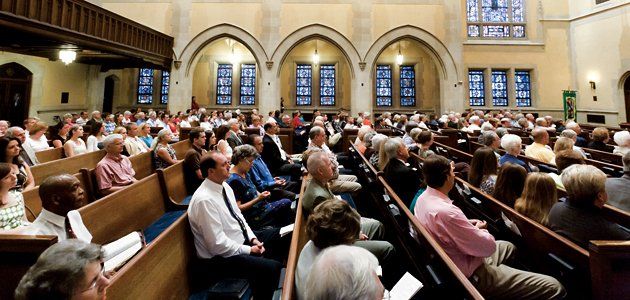
Every day, the economist Daniel Hungerman looks at the graph that hangs above his desk at the University of Notre Dame. One jagged line goes down and up. This is America's gross domestic product since 1972. Another jagged line goes up and down. This is the religiosity of Americans over the same period, as measured by church attendance. The lines show an almost exact inverse correlation.
"You can see as clear as day a negative relationship in this picture," says Hungerman, who threw the chart together for fun. "When the business cycle goes up, religious attendance goes down, and vice versa. The good mystery is why."
Why indeed? The interplay between prosperity—and poverty—and religious observance has become a recent fascination of a small number of economists and other social scientists, for understanding these patterns can help us better predict the future. Do hard times produce more fundamentalists? Do prosperous times produce more do-gooders? Will a lengthy economic slump pull people into the pews to pray for jobs and ladle soup for needier neighbors? Or will it keep people at home on the couch, nursing psychic wounds and cursing their creator?
These questions are harder to answer than one might expect because in polls people tend to overstate their church attendance and because other aspects of religiosity—private prayer, for example—are impossible to measure. Intuitively, though, we think we can solve Hungerman's mystery. There are no atheists in foxholes, the saying goes. We assume that tough economic times, like war, prompt existential self-interest: in the unemployment line, even a master of the universe will pray. The people at Gallup tried to debunk this assumption recently, with new numbers showing that church attendance was rising with the economic recovery (to 43.1 percent from 42.8 percent over the last year), but few economists took the bait. "Oh, boy," says David Beckworth, an economist at Texas State University, "three data points makes it hard to conclude anything."
The Gallup data do raise the intriguing possibility that the conventional wisdom is wrong, and here Hungerman agrees. He gently discounts the "atheists in foxholes" hypothesis. While church attendance overall may rise and fall in inverse correlation to American economic health, he says, individuals' church attendance seems not to change at all based on income. "Religion is not the province of the poor or uninformed," writes Larry Iannaccone in his "Introduction to the Economics of Religion." "Rates of religious belief and religious activity tend not to decline with income, and most rates increase with education." Or, as Hungerman puts it, if the atheists-foxholes hypothesis were true, "then real poor people would go to church like crazy and no one else would go very much." (Economic studies do show that the poor are attracted to fundamentalist, Pentecostal, and sectarian branches of religion. It's not that they go to church more during hard times; it's that they go to different kinds of churches.)
Further, as Robert Putnam, the Harvard political scientist and author of the forthcoming American Grace: How Religion Is Reshaping Our Civic and Political Lives, says, prolonged unemployment does not inspire people to go to church. On the contrary, it keeps them away. "The working class have tended to withdraw from church attendance over the past few decades, and the effects of unemployment have been concentrated among the working class.
"The net effect of joblessness is to cause people to be widely depressed," he adds. "What I suspect is that most unemployed people are in front of the TV on Sunday morning, or, if they're a little more with it, surfing the Web."
Hungerman's best guess explanation for the wide spaces and tight spots in his graph has nothing to do with God and self-interest ("if I pray in church, I will get a job") but with something grander: a sense of global interconnectedness. "Maybe when the economy turns sour, no matter how much money you make, you get nervous and decide to go to church and talk with your buddies and get a sense of what's going on in your community. Or maybe people's desire for spiritual guidance is influenced by their perception of how the world's doing outside of themselves. Church attendance may not reflect our own circumstances but our own idea of how the world is doing beyond us." In other words, Hungerman's picture may illustrate our concern for our neighbors: down in good times and up in bad.
Uncommon Knowledge
Newsweek is committed to challenging conventional wisdom and finding connections in the search for common ground.
Newsweek is committed to challenging conventional wisdom and finding connections in the search for common ground.
About the writer
To read how Newsweek uses AI as a newsroom tool, Click here.





